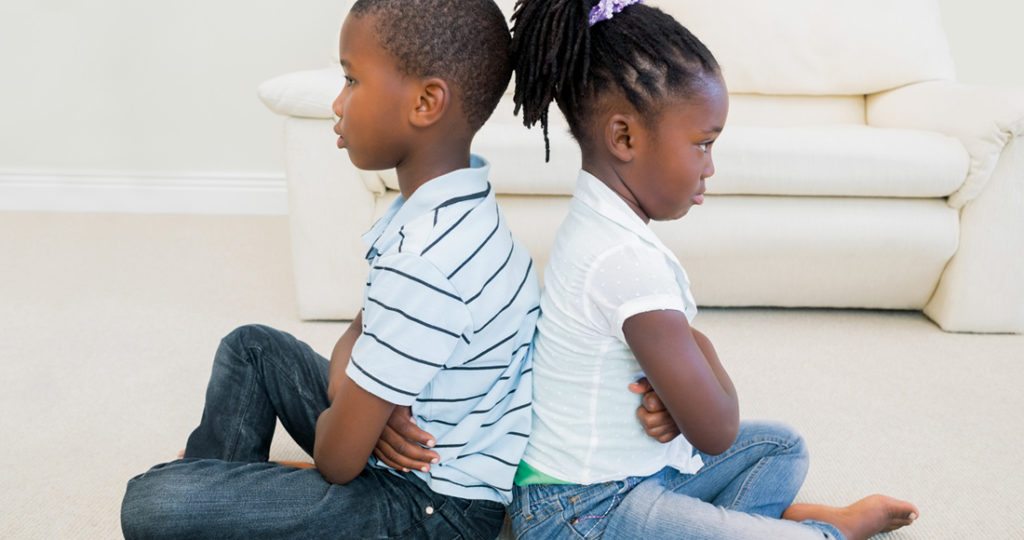It’s normal for parents to want their children to get along well, but it’s also normal for kids to fight sometimes and compete with one another. So how do you raise them to be (mostly) great friends with a healthy degree of competition? Some rivalry can be expected, especially among children of similar ages, but…
It’s normal for parents to want their children to get along well, but it’s also normal for kids to fight sometimes and compete with one another. So how do you raise them to be (mostly) great friends with a healthy degree of competition?
Some rivalry can be expected, especially among children of similar ages, but for your own sanity, it’s advisable to foster healthy competition and not jealousy.
When it comes to harmonious sibling relationships, there are some great celeb role models we can learn from. Tennis stars Venus and Serena Williams and footballing brothers Kolo and Yaya Toure compete against one another professionally, but always remain respectful and supportive of one another. In the music world, siblings Beyoncé and Solange Knowles are proof that healthy competition is possible.
HEALTHY VS UNHEALTHY
Claudia Abelheim, head of Youth Services for The Family Life Centre in Johannesburg, says sibling rivalry is a type of competition among siblings that includes a degree of animosity. ‘Siblings often compete with each other,’ she says, ‘for example for toys or attention from parents.’ This kind of rivalry can affect children’s self-esteem, especially if one is always the ‘loser’ or is bullied by another.
Healthy competition, she says, is when you let others inspire and motivate you to do better, or try harder, but without it having an effect on your self-esteem. Think of the Williams sisters, who’ve inspired and supported one another at the highest level of tennis. ‘Unhealthy competition, especially between siblings, can be very damaging to one’s self-esteem, and can have lasting consequences,’ says Abelheim.
DEVELOPMENTAL STAGES
We’ve all seen toddlers who are protective and territorial over their belongings as they learn to be more assertive. When their baby brother or sister takes their toy, they might react aggressively.
School-age children, on the other hand, are starting to learn the difference between right and wrong and to develop a sense of fairness. ‘They might feel that one child gets preferential treatment,’ says Abelheim, ‘and this will challenge their beliefs about fairness and they could become petulant.’
Teenagers have a very keen sense of justice. Jonathan (18), says he was very upset when his younger brother Eric got a cellphone when he was nine. ‘I had to wait until I was 12,’ says Jonathan. Eric was only given the phone because Jonathan had moved on to high school (with his phone) so their parents could no longer contact Eric that way, but Jonathan felt it was unfair.
‘We’re past the squabbling phase now,’ smiles Jonathan. ‘Eric prods me to exercise, as he’s more disciplined, and I encourage him to better his time when we do park runs. Our parents have taught us to support one another in our activities.’
ADULT RIVALRIES
As adults, sibling rivalry can often be more subtle and come out in a passive-aggressive way. A common form of this behaviour is undermining one another in front of friends or family with the intention of building themselves up while making their sibling feel less worthy.
BALANCING ACT
Treating children fairly can be a bit of a tightrope walk, and sometimes parents foster rivalry among their children without meaning to or even being aware of doing so.
‘Parents often compare siblings to one another, especially when one’s a higher achiever,’ says Abelheim. She warns that this can cause resentment between siblings.
‘They’ll often have the sense they’re not good enough and will blame their sibling for this feeling,’ she says.
EXPERT TIPS
Here’s how to encourage healthy competition as opposed to an aggressive rivalry between children:
Don’t compare. Never use terms such as ‘why can’t you be more like your brother?’ Help them appreciate each other’s differences. Focus on each child’s positive qualities.
Treat them uniquely. Acknowledge their individual needs and their feelings – never dismiss them. Be fair and have the same rules and consequences for breaking them.
Stop hurtful behaviour. Encourage your child to write a letter to get their emotions out, rather than screaming or shouting. Role-play how they can say what they feel without name-calling or labelling each other.
Encourage individual interests. Each child is an individual, so let them discover and develop their own talents and interests. If they do have similar interests, encourage them to help one another.
Emphasise self-improvement. Encourage them to do their best and learn new skills. Winning is a bonus, not the final aim. Be careful with comments after matches or events – always praise effort and don’t dwell on faults or failures.
Teach respect. There’s nothing wrong with wanting to do better than someone else, but it should be done with fairness and respect for one another.
Stay out of squabbles. Only intervene when there’s aggression. Practise as a family how to talk and listen to one another as you resolve the conflict.
DIRECTORY
Family Life Centre
Phone: +2711 788 4784 +2782 231 0371
Website: familylife.co.za
Family and Marriage Society of South Africa (FAMSA)
Phone: +2711 975 7106/7
Website: famsa.org.za
Lifetalk for Parents
Offers a guide to issues facing parents with young children and teens.
Website: lifetalk.co.za
Recommended book: Siblings Without Rivalry, Adele Faber and Elaine Mazlish, R229, takealot.com
By Vida Li Sik
ASK AN EXPERT
JET CLUB MEMBERS HAVE FREE ACCESS TO JET CLUB’S HELPLINES.
TEEN ADVICE CARE LINE
SA & Namibia
0800 0045 45
Botswana, Lesotho & Swaziland
+2711 991 8258
HOW TO COPE WITH SIBLING RIVALRY
 Reviewed by Michelle Pienaar
on
May 15, 2018
Rating:
Reviewed by Michelle Pienaar
on
May 15, 2018
Rating:
 Reviewed by Michelle Pienaar
on
May 15, 2018
Rating:
Reviewed by Michelle Pienaar
on
May 15, 2018
Rating:





